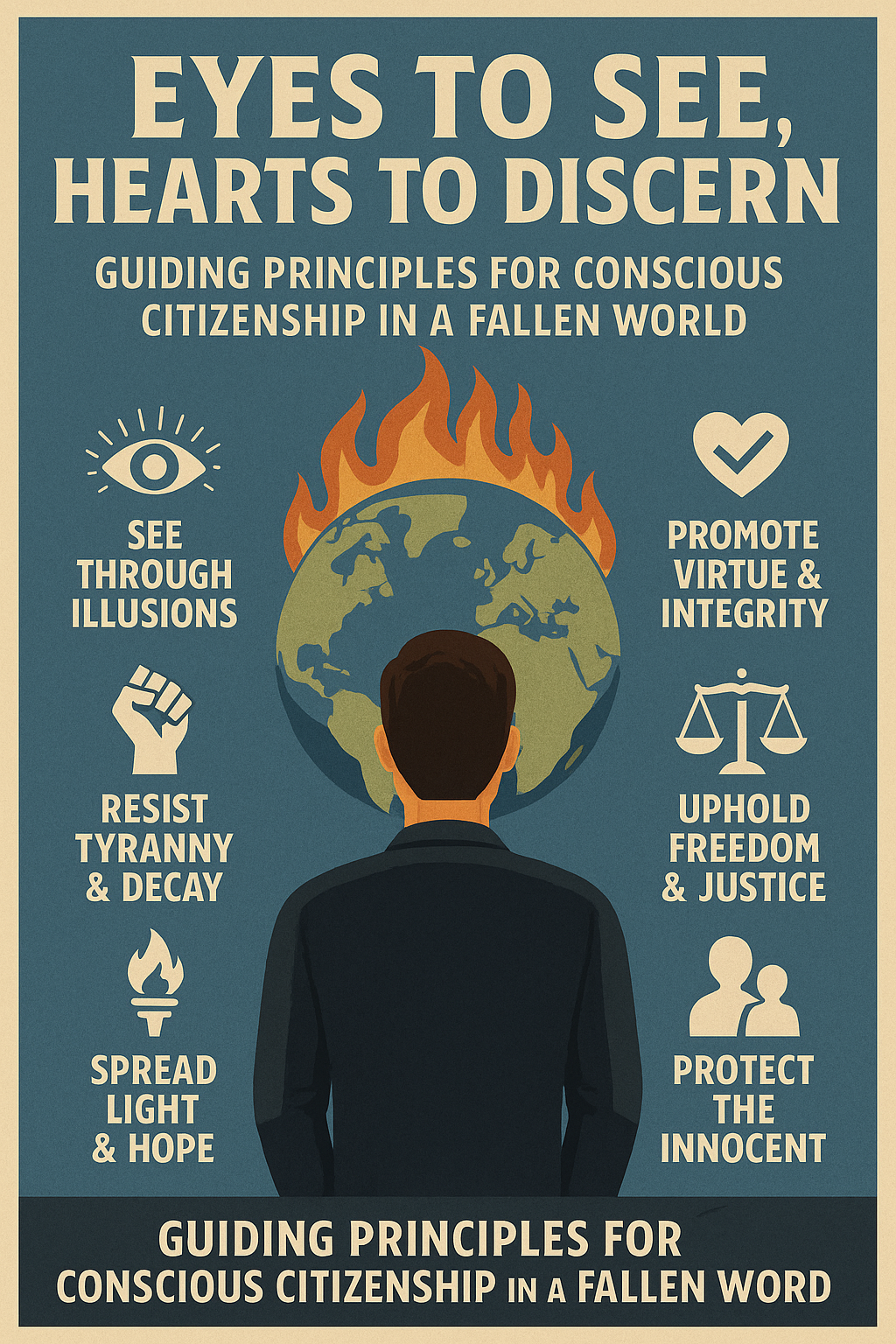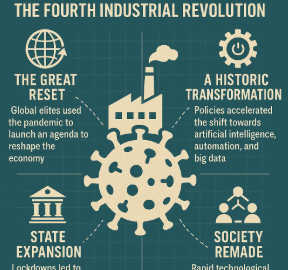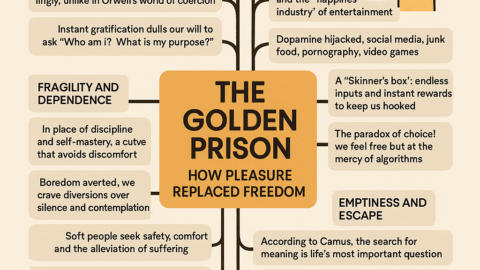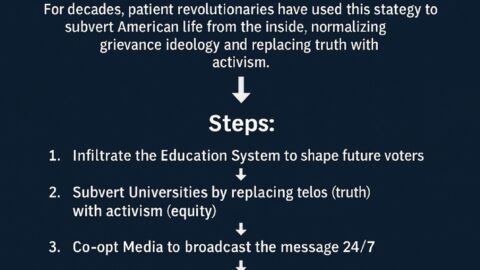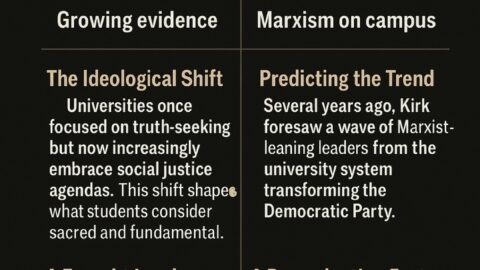In an age marked by anxiety, division, and relentless distraction, the need for deep awareness and principled living has never been greater. As individuals, families, communities, and nations, we face profound questions about identity, morality, and destiny. Yet these questions are not new. The wisdom to navigate them has existed for millennia—through scripture, philosophy, and the tested observations of civilization itself.
To truly evaluate where we are and who we are becoming, we must assess our position not only economically or politically, but morally, emotionally, psychologically, and spiritually. What we need is not more information, but wisdom—the ability to discern, prioritize, and align our lives with truth. This article lays out a framework drawn from some of the most powerful paradigms available to help us do just that.
Principle-Centered vs. Personality-Centered Living (Stephen Covey)
Stephen Covey distinguishes between character ethics and personality ethics. The former builds from the inside out—on integrity, humility, service, and patience. The latter attempts shortcuts through charm, image, and manipulation. When societies elevate charisma over character, they sow the seeds of decline.
Covey’s solution is simple but revolutionary: become principle-centered. Instead of being reactive or ego-driven, we anchor our lives in eternal, unchanging truths—justice, honesty, self-discipline, stewardship, and compassion. From this foundation, we can think clearly and act courageously.
Tytler’s Cycle and the Rise and Fall of Nations
As observed by Alexander Tytler and repeated in the Bible, Book of Mormon, and world history, civilizations rise from bondage to spiritual faith, then courage, then liberty, then abundance—and tragically, decline into selfishness, complacency, apathy, dependence, and back to bondage.
Understanding where we are in this cycle—personally or nationally—helps us anticipate what’s coming and act intentionally. It reminds us that freedom is fragile, and spiritual renewal is the only path back from moral collapse. We must not confuse material abundance with moral health.
In-the-Box vs. Out-of-the-Box (Arbinger Institute)
The Arbinger Institute teaches that people operate in two modes: the Heart of Peace and the Heart of War. When we are “in the box,” we justify ourselves and dehumanize others. We blame, resent, and act from ego. When we are “out of the box,” we see people as people. We act with humility, empathy, and responsibility.
A nation full of “in-the-box” citizens becomes fractured, tribal, and unteachable. Getting “out of the box” starts with one person, one relationship, and one choice to let go of pride.
The Coffee Bean, the Egg, and the Potato
In boiling water (adversity), the potato softens, the egg hardens, but the coffee bean transforms the water. This timeless metaphor asks: how do you respond to pressure?
- Are you the potato, letting pain break you down?
- Are you the egg, letting trauma harden your heart?
- Or are you the coffee bean, changing your environment through inner strength?
Christ was the ultimate Coffee Bean—surrounded by corruption, he radiated divine truth and changed the world. Citizens of character are not victims of their culture—they reshape it from the inside out.
Mindset: Fixed vs. Growth vs. Faith-Filled
- A Fixed Mindset avoids challenge, fearing failure.
- A Growth Mindset sees effort as the path to mastery.
- A Faith-Filled Mindset trusts in God’s purpose, even through suffering.
Faith-filled people are not naive; they are deeply resilient. They know that growth isn’t just about achievement—it’s about sanctification. True education isn’t just acquiring knowledge—it’s cultivating wisdom and virtue.
Feeding the Good Wolf (The Two Wolves Parable)
A grandfather once told his grandson, “There are two wolves inside me—one is anger, envy, pride, and ego. The other is love, humility, truth, and compassion.”
“Which wolf wins?” the boy asked.
“The one you feed.”
Modern society feeds the bad wolf—through media, culture, and algorithms that reward outrage. We must choose daily what to feed: bitterness or gratitude, apathy or awareness, fear or faith.
Serving Two Masters and the Trap of Idolatry
“No man can serve two masters.” (Matthew 6:24)
Whether it’s money, politics, fame, comfort, or conformity—idolatry is the core disease of every fallen civilization. Avraham Gileadi taught that modern idolatry is often hidden in institutions, narratives, and even religious facades. When we pledge allegiance to anything above truth, we fall into spiritual blindness.
To serve God means to live as if truth and love are more important than power and safety. That is the path Christ laid before us—and it is always uncomfortable, always unpopular, always transformational.
Education: The Battle for the Soul
As Plato said, “Education is teaching our children to desire the right things.”
Yet most modern education teaches utility, conformity, and self-worship. The Tytler Cycle reminds us: in the Liberty phase, parents teach principles. In the Abundance to Dependence phase, they outsource moral formation to media and schools.
True education is soul formation. It means showing our children how to discern idols, how to get “out of the box,” how to feed the good wolf, and how to become coffee beans. It means raising warriors, not consumers.
The Two Paths: Godly or Worldly
In the end, we all walk one of two roads. The narrow road leads to life. The wide road leads to destruction (Matthew 7:13-14). The difference is not religion, but allegiance.
The world says: Fit in. Indulge. Fear. Follow.
God says: Stand. Sacrifice. Hope. Transform.
A principle-centered, God-centered citizen is not naïve. They are awake. They see the battle behind the headlines, the soul behind the statistics, the Savior behind the suffering.
Conclusion: Living Eyes Wide Open
If we are to restore our families, communities, and nation, we must stop reacting and start reflecting. We must teach and live from principle, not pressure—from truth, not trend—from faith, not fear.
This isn’t about politics. It’s about the soul of civilization.
And it starts with you.

